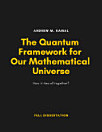Metamaterials and Wave Control
এই ইবুকখনৰ বিষয়ে
On the one hand, this success can be attributed to dreams of new physical objects which are the consequences of the singular properties of metamaterials. Among them, we can consider the examples of perfect lensing and invisibility cloaking. On other hand, metamaterials also provide new tools for the design of well-known wave functions such as antennas for electromagnetic waves.
The goal of this book is to propose an overview of the concept of metamaterials as a perspective on a new practical tool for wave study and engineering. This includes both the electromagnetic spectrum, from microwave to optics, and the field of acoustic waves.
মূল্যাংকন আৰু পৰ্যালোচনাসমূহ
লিখকৰ বিষয়ে
Éric Lheurette is Full Professor at the University of Lille in France. He has authored and co-authored more than 50 journal papers and presentations for international conferences. His current research interests include electromagnetism, the design and technology of metamaterials and terahertz passive devices.




